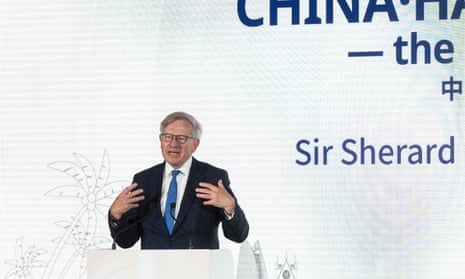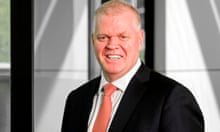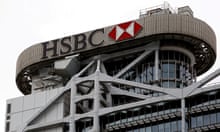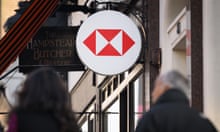A senior executive at HSBC has apologised after saying the “weak” UK government had caved in to the US in its approach to doing business with China.
Sir Sherard Cowper-Coles, the bank’s head of public affairs and a former British diplomat, said sorry after “sharing his personal views” on Britain’s policy towards Beijing at a private event, a spokesperson for HSBC said.
They added that Cowper-Coles’s comments were made under the Chatham House rule, a longstanding convention that means those in attendance cannot attribute remarks at an event to individual speakers.
The banking executive cited the UK’s decision to ban Chinese telecoms giant Huawei from its 5G network as an example of giving in to US demands, according to Bloomberg, which first reported on his remarks made at the private meeting.
HSBC is Europe’s largest bank, is listed on the London Stock Exchange and has its global headquarters in the UK, but it makes a large share of its profits in Asian markets. It has a big presence in Hong Kong and on mainland China, as well as in the US.
As head of public affairs, Cowper-Coles’s role means he is responsible for the bank’s relationships with governments around the world. He is also chair of the China-Britain Business Council, a lobby group. In the 2000s he served as British ambassador to Israel, Saudi Arabia and then Afghanistan.
A spokesperson for HSBC said: “Sherard was at a private roundtable discussion under the Chatham House rule and shared his personal views.”
Cowper-Coles said in a statement via HSBC: “I was speaking at a private event under the Chatham House rule and my personal comments don’t reflect the views of HSBC or the China-Britain Business Council. I apologise for any offence caused.”
HSBC has long found itself caught in an increasingly tense relationship between western and Asian markets.
US-China relations have sharply deteriorated in recent years, with competition for economic dominance, the future of Taiwan, and human rights abuses towards the Uyghur population of Xinjiang province, emerging as major faultlines.
Businesses have found themselves caught in the middle of a tit-for-tat trade and investment war as a result. Extra import taxes have been slapped on goods by both parties, and broader restrictions placed on US exports to China of advanced technologies, including microchips.
Beijing and Washington held talks in June and July in an effort to stabilise ties, a mark of how damaged communications have become between the superpowers.
The crackdown on freedom of expression and other rights in Hong Kong under China’s “national security law” has also driven a political wedge between London and Beijing. One aspect of the UK’s response, the British national (overseas) immigration route for Hongkongers to move to Britain, has been a particular flashpoint.
Cowper-Coles has previously said publicly that the US has been better at reaping economic reward from doing business with China than the UK, arguing those who “demonise” the country are naive.
“I think the politicians in my own country, in America and elsewhere who demonise China, who see the world as black and white it is they who are naive,” Cowper-Coles told the Chinese state-run CGTN news channel in May.
“Some of the nonsense we hear talked in the US Congress, in the US media, and in parts of the parliament in London about China these days just shows how ignorant people are and how prejudiced. [And] they need to come to China and see for themselves the realities,” he added.
He also predicted in the interview that China would become the world’s largest economy.









